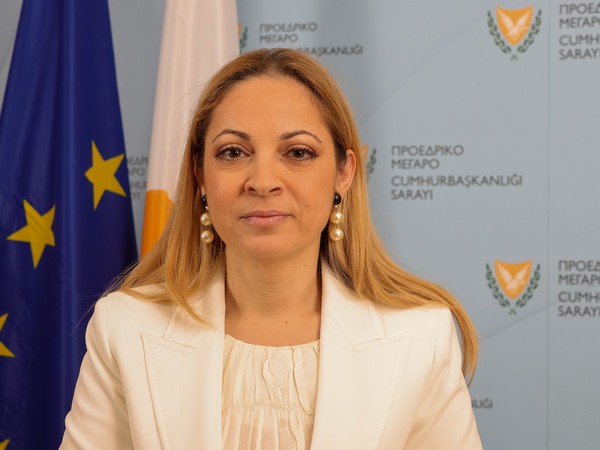Press Releases

22-05-2023 11:14
Address by the Minister of Justice and Public Order, Ms Anna Koukkides-Prokopiou, at a meeting of the Committee on Legal Affairs and Human Rights of the Parliamentary Assembly of the Council of Europe
The European Convention on Human Rights in Cyprus
It is a great honour to be here today and address this very important meeting organized by the Committee on Legal Affairs and Human Rights of the Parliamentary Assembly of the Council of Europe. I would like at the outset to congratulate the organizers of this very topical and important event.
Ι am very pleased to confirm that the bonds between the Republic of Cyprus and the Council of Europe are very long, strong and undisputed. They have indeed shaped our present and will certainly continue to define our future.
I attach a particular significance to the fact that one of my first appearances as the Minister of Justice and Public Order concerns the role of the European Convention on Human Rights, which is a permanent reference point in my work. As a member of government of one of the member states of the Council of Europe, an organization which promotes human rights, democracy and the rule of law, I feel that I have a special responsibility to ensure that the European Convention of Human Rights remains the lighthouse for all those seeking protection of their human rights.
Today’s event takes place in extraordinary circumstances for the values the Council of Europe represents. Russia’s invasion to Ukraine has caused terrible human suffering to millions of people. Many thousands were ruthlessly killed, including hundreds of children and millions of people saw their lives turned upside down. It is encouraging that the Parliamentary Assembly of the Council of Europe expressed its support for Ukraine from the beginning. Europe has been united – in both word and deed – in defending the right of sovereign nations to determine their own future.
When the Convention was adopted in the aftermath of second world war, our continent looked very different. If today’s picture looks much better, it is largely thanks to the Convention and the human rights protection system that the Council of Europe has established that has become a source of inspiration for countries, for courts and for individuals in pursuing justice, equality and dignity.
Nearly 75 years after its adoption, the European Convention on Human Rights and the European Court of Human Rights remain the ultimate guarantors of individual rights across our continent. They demonstrate resolve to halt and reverse the current democratic backsliding and to reinstate human rights, freedoms and features of democratic life in the European continent.
It goes without saying that States Parties to the Convention are legally obliged to execute its final binding judgments. Delays in implementing the Court's judgments by citing technical problems or obstacles, such as the lack of political will or insufficient resources can’t be tolerated.
It is deeply regrettable that a large number of the Court’s key judgments on human rights violations are still not implemented in full, or even not at all, due to the lack of political will. One such case is the 4th Interstate Case Cyprus v. Turkey, in which Turkey has failed to date to comply with the Court’s judgment. Unfortunately, Turkey has one of the highest numbers of non-implemented Court judgments.
The Council of Europe and the Convention system over which it presides has become nowadays an established, effective and dynamic means to protect human rights, democracy and the rule of law in the interests of every European. Progressively the European Convention has turned into a valuable tool for understanding the European law and human rights values. Besides, it has been recognized as a part of our ordinary language and common legal discourse, mostly after the individual complaint mechanism was set up.
In this respect, the Convention system does not deal with abstract human rights grievances but with concrete human rights complaints and aims at providing redress to victims of violations. After all the ECHR is a person’s last resort for holding the state to account when it has abused their rights. The adherence to this paramount principle has earned the Convention recognition as a unique judicial human rights system. Most importantly it has also secured the continued acceptance of the Court’s judgments by member States. We must all preserve this achievement which is vital to the efficiency and credibility of the Convention system.
The second major achievement is the Convention’s role in shaping the European legal identity. This success is contingent on the Court’s ability to find common ground between different legal systems of our members States and to strike a fine balance between public and individual concerns. While leaving member States a margin of appreciation in some areas, the Court adopted the strictest approach when it comes to protecting the very essence of fundamental rights. The balance between judicial activism and restraint is a paradigm that goes throughout the Convention’s history.
During these years, distinguished Cypriot legal scholars have served the Court. The Convention’s case-law has proved to be a force of reform for national legislation and domestic law. A wide range of human rights have been more effectively safeguarded thanks to the implementation of the Court’s judgments.
Applying the Convention has also led to several legislative changes in order to comply with significant judgments of the Court. The Convention has enhanced national respect of the rights of vulnerable groups, gender rights and the promotion of inclusive policies.
Furthermore, constant and interactive dialogue between the European and national authorities has ensured a greater involvement of national courts in the convention system. Thus, conventionality control has become a significant part of the actual judicial review, so as to prevent human rights violations and comply with European Convention standards. In this respect the Convention and the Court’s decisions establish our common ground, exceeding the boundaries of the law and forging our European culture and values.
Ladies and gentlemen,
The European Convention of Human Rights is a dynamic human rights’ text and a living instrument, which has been a crucial feature of Strasbourg’s case law from its very start. Evolutive interpretation is inherent to the Court's role and legitimacy. Such a dynamic and evolutive interpretation of the Convention has brought a contemporary reading of the rights protected and of the obligations of member states on the face of new challenges emerging in society. In this respect, we all have a particular responsibility to ensure that the European Convention and the European Court of Human Rights remain the lighthouse for all those seeking protection on their human rights. Let’s bear in mind that the Convention on Human Rights and the Council of Europe create a common European home for human rights and democracy for almost 700 million people.
I intend to contribute to this crucial endeavor since it is my task to protect and fulfill the human rights enshrined in the European Convention on Human Rights. Your Parliamentary Assembly with its very valuable work brings together the perspectives of people from all over Europe.
Reaching the conclusion of my intervention, I assure you that the Council of Europe can continue to count on the Republic of Cyprus support. I wish you every success as you continue to perform your crucial role as protectors of human rights, the rule of law and democracy. And I sincerely share your hope that liberty, justice and cooperation will prevail throughout Europe.
(NG/ECHR)
Relevant Press Releases







